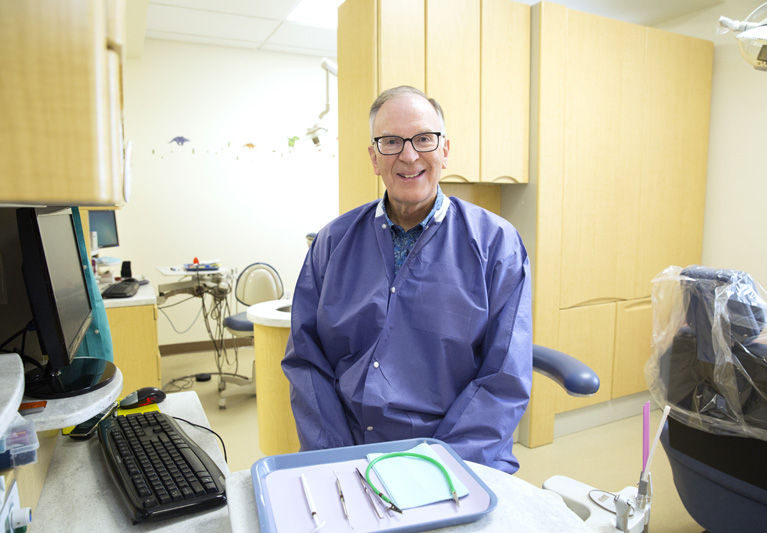
You graduated from the Harvard School of Medicine. You logged two years as an oral and maxillofacial surgeon with the U.S. Air Force at the MacDill air base outside Tampa. After that, you ran your own dental practice in upstate New York for some 35 years before moving to Indian River County.
So what the heck do you do for an encore?
If you’re Dr. Richard Carlin, you dive head-first into a poorly paid part-time job – a job you wouldn’t give up for anything.
Twice each week Carlin brings his oral and maxillofacial (OMF) surgical skills to the Treasure Coast Community Health center in Vero Beach.
OMF surgeons are dual-qualified in both dentistry and medicine. They treat a wide variety of conditions including head and neck cancers, salivary gland diseases, facial deformities, pain, impacted teeth, cysts and tumors of the jaw, as well as mouth ulcers and a wide variety infections.
Since TCCH’s mission is to serve those in the community with little or no access to traditional healthcare services, let alone the ability to pay for that care, finding specialized physicians such as Carlin – who are willing to work for far less than they made in the private sector – is the only way that mission can be accomplished.
And TCCH keeps Carlin and his colleagues busy.
“I see five-to-six surgical cases and three-to-four consults a day working two days a week,” says the affable Carlin, adding that, “I work on impacted wisdom teeth, full mouth extractions, large cysts, biopsies, difficult extractions, incision and drainage and the management of facial infections. We have (also) diagnosed six major oral cancer cases in the last four months.”
On the day of this interview, Carlin, along with Dr. Gerald Goebel and Dr. Zenaida Bongato, face a rare and complex condition known as “Apert Syndrome” in a local teenage boy.
“Apert syndrome is a genetic disorder characterized by the premature fusion of certain bones in the skull. This early fusion prevents the skull from growing normally and affects the size and shape of the head and face,” according to The National Institutes of Health.
When the head is unable to grow normally, it can lead to a sunken or almost concave facial appearance as well as bulging, wide-set eyes and badly underdeveloped jaws which almost inevitably leads to a host of dental problems.
As if that wasn’t enough, people with Apert Syndrome also face having webbed or fused fingers and toes, hearing loss, recurring ear infections and cleft palates. In this particular case, with TCCH’s help, the youngster being seen by doctors Carlin, Goebel and Bongato will soon be undergoing multiple surgeries at Shriner’s Children’s Hospital in Tampa to correct the many physical limitations that he has had to deal with since birth.
Before those operations can take place, however, the boy’s dental issues need to be resolved so there’s no risk of infection during his surgeries in Tampa.
Without TCCH’s help, none of those problems would ever have been addressed.
In a town full of luxury automobiles and pricey waterfront homes, Carlin points out that one-in-four seniors and one-in-five children live at or below the poverty level. He adds that 26 percent of Indian River County residents under 65 are without health insurance.
“These people,” explains Carlin, “comprise the working poor, the uninsured, the under-insured, minorities and the homeless.” At TCCH, Carlin continues, “38 percent of our patients are on Medicaid and most private medical and dental practices do not accept Medicaid.”
Carlin knows why that is. “I tried taking Medicaid (in my private practice) for several years and then gave up because it’s so onerous. You have to almost have one dedicated person who is very adept with dealing with the ins and outs and all the regulations and the refusals and the re-submissions.”
That’s where the TCCH “navigators” come in.
TCCH’s chief executive officer, Vicki Soulé, is unabashedly proud of what she calls her team of dedicated navigators including Margie Hansler, Patricia Tovar, Melissa Cantu and Kim Platt.
The navigators, says Soulé, scour the web, help complete forms on behalf of their patients, and try to arrange emergency Medicaid coverage for everything from impacted wisdom teeth to cancer treatments. They even help keep track of homeless patients while arranging transportation for those patients to get to their appointments.
As a result of those efforts – and those of the TCCH doctors – this community-based program is able to see and treat some 14,000 patients each year.
TCCH receives only about 22 percent of its operating budget from federal sources according to Carlin.
The rest of its funding, according to Soulé, comes through what patients can pay and from Medicaid, the county’s hospital taxing district, the We Care program and from donations.
(The secure TCCH website at http://www.tcchinc.org has a “donate” button is on the top right side of the landing page for those who may want to contribute.)
TCCH operates four locations in the county, offering family medical, pediatric and GYN care, health navigators, radiology, dental services and oral surgery.
In Fellsmere there are offices at 12196 County Road 512 and at 44 North Pine Street.
In Vero Beach, TCCH has offices at 1553 U.S. Hwy. 1 and at 1545 9th Street SW.
A single phone number, 772-257-8224, serves all four offices.



